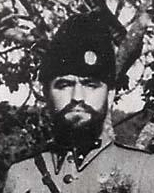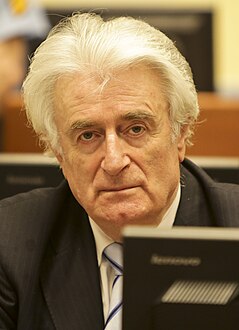
Saint Nikolai Velimirovich of Ohrid and Žiča or Nikolaj Velimirović was bishop of the eparchies of Ohrid and Žiča (1920-1956) in the Serbian Orthodox Church, an influential theological writer and a highly gifted orator, known as The New Chrysostom.

Foča is a town and a municipality located in eastern Bosnia and Herzegovina. It is situated on the banks of Drina river. As of 2013, the town has a population of 12,234 inhabitants, while the municipality has 18,288 inhabitants.

The Macedonian Orthodox Church – Ohrid Archbishopric, or simply the Macedonian Orthodox Church, is the largest body of Christians in the Republic of North Macedonia. It claims ecclesiastical jurisdiction over the Republic of North Macedonia and is also represented in the Macedonian diaspora. In 1959, the Holy Synod of the Serbian Orthodox Church granted autonomy to the Macedonian Orthodox Church in the then-Socialist Republic of Macedonia as the restoration of the historic Archbishopric of Ohrid, and it remained in canonical unity with the Serbian Church under their Patriarch. In 1967, on the bicentennial anniversary of the abolition of the Archbishopric of Ohrid, the Macedonian Holy Synod unilaterally announced its autocephaly and independence from the Serbian Orthodox Church. The Serbian Holy Synod denounced the decision and condemned the clergy as schismatic. Thenceforth, the Macedonian Church has remained unrecognized by the Ecumenical Patriarchate of Constantinople and all the other canonical Orthodox churches in defense of Serbian opposition. Since May 2018 however, the Church′s status has been under examination by the Ecumenical Patriarchate of Constantinople. The primate of the Macedonian Orthodox Church is the Metropolitan of Skopje and Archbishop of Ohrid and Macedonia and of Justiniana Prima.

Pavle was the 44th Patriarch of the Serbian Orthodox Church, the spiritual leader of Eastern Orthodox Serbs, from 1990 to his death. His full title was His Holiness the Archbishop of Peć, Metropolitan of Belgrade and Karlovci, and Serbian Patriarch Pavle. Before his death, he was the oldest living leader of an Eastern Orthodox church. Because of poor health, he spent his last years in the Military Medical Academy in Belgrade, while his duties were carried out by Metropolitan Amfilohije.

Varnava Rosić was the Patriarch of the Serbian Orthodox Church from 1930 to 1937. He was born Petar Rosić in Pljevlja, belonging at that time to the Ottoman Empire, on August 29, 1880.

Momčilo Đujić was a Serbian Orthodox priest and Chetnik commander who led a significant proportion of the Chetniks within the northern Dalmatia and western Bosnia regions of the Independent State of Croatia during World War II. After the assassination of King Alexander of Yugoslavia in 1934, he joined the Chetnik Association of Kosta Pećanac. After the invasion of Yugoslavia, he defended local Serbs against the Croatian fascist Ustaše regime and collaborated with the Axis powers against the Communist-led Yugoslav Partisans throughout the remainder of the war as the commander of the Chetnik Dinara Division. He survived the war, surrendering to the western Allies and eventually emigrating to the United States. He was tried and convicted in absentia for war crimes by the Yugoslav government, including collaboration and responsibility for the deaths of 1,500 people during the war.

Serbian Americans, in Serbian, the community is also known as American Serbs, are United States citizens of Serb ethnic ancestry. As of 2012, there are 199,080 American citizens of "Serbian ancestry" who identify as having Serb ancestry. However, the number may be higher, as some 328,547 people who identify as Yugoslavs living in the United States, and most Yugoslav immigrants were of Serb ethnicity.

Radovan Karadžić is a Bosnian Serb former politician and convicted war criminal who served as the President of Republika Srpska during the Bosnian War and sought the unification of that entity with Serbia.

Eparchy of Raška and Prizren or Serbian Orthodox Eparchy of Raška-Prizren and Kosovo-Metohija is one of the oldest eparchies of the Serbian Orthodox Church, featuring the seat of the Serbian Orthodox Church, the Serbian Patriarchal Monastery of Peć, as well as Serbian Orthodox Monastery of Visoki Dečani, which together are part of the UNESCO World Heritage sites of Serbia.
Nikodim II was the Serbian Patriarch in the period of 1445–1455.

Eparchy of Mileševa is the one of eparchies of the Serbian Orthodox Church, and is seated in Prijepolje, in the Mileševa monastery. Since 2015, the administrator of eparchy is Joanikije Mićović, bishop of Budimlja and Nikšić.
The Battle of Pljevlja, was a World War II attack in the state of Montenegro by partisans on Italian military forces occupying the city of Pljevlja under the command of General Arso Jovanović and Colonel Bajo Sekulić, who led 4,000 Montenegrin Partisans.
The Sandžak Muslim militia was established in Sandžak and eastern Herzegovina in Axis occupied Yugoslavia between April or June and August 1941 during World War II. It was under control of the Independent State of Croatia until September 1941, when Italian forces gradually put it under their command and established additional units not only in Sandžak, but in eastern Herzegovina as well. After the capitulation of Italy in September 1943 it was put under German control, while some of its units were merged with three battalions of Albanian collaborationist troops to establish the "SS Polizei-Selbstschutz-Regiment Sandschak" under command of the senior Waffen SS officer Karl von Krempler.

Jovan Ćirković, known as Čifa (Чифа) or Ćirko-paša (Ћирко-паша), was a Serbian teacher, revolutionary (Chetnik) during the Macedonian Struggle, and politician.

Holy Trinity Monastery, Pljevlja is a medieval Serbian Orthodox monastery complex (lavra) in Pljevlja, Montenegro. It is located about 37 miles north of Durmitor, and 24 miles from Đurđevića Tara Bridge.

The Pljevlja Gymnasium or Tanasije Pejatović Gymnasium is a Serbian secondardy school. It was established by the Serbian Orthodox Church on November 18, 1901. At that time, it was the eighth Serbian classical gymnasium in the Sanjak of Novi Pazar that catered to Christian pupils living in the Ottoman Empire. This high school became one of the most significant Serbian educational institutions in the Kingdom of Serbia.
Dovolja is a Serbian Orthodox monastery located on the right river banks of the Tara, near Pljevlja, in the village of Premćani within the hamlet of Dovolja. It is dedicated to the Assumption of the Holy Mother of God. It is believed to have been founded by King Stefan Milutin at the end of the 13th century. It was first mentioned in 1513. It is ecclesiastically administrated by the Eparchy of Mileševa. Some time after 1699, the relics of Archbishop Arsenije I were moved from Dovolja to the Dobrilovina Monastery.
The Bukovica massacre was a massacre of Muslims in Bukovica, Pljevlja, in the Axis-occupied Italian governorate of Montenegro. It took place February 4–7, 1943, during Pavle Đurišić's Chetniks' 1943 cleansing campaign. The massacre was aimed at establishing Chetnik control over territories held by the Sandžak Muslim militia. After a short battle with the Muslim militia, Chetniks captured Bukovica and killed over five hundred civilians.
















